quarta-feira, dezembro 27, 2006
The Walls I Build
"God has not been trying an experiment on my faith or love in order to find out their quality. He knew it already. It was I who didn’t. In this trial He makes us occupy the dock, the witness box, and the bench all at once. He always knew that my temple was a house of cards. He only way of making me realize the fact was to knock it down."
A Grief Observed / Lewis, C.S
Let's Talk About Real Reality
such an apparatus let through?"
A Grief Observed / Lewis, C.S.
I found this quote very interesting and very close to something I've been asking myself for a long time. If what I've lived in my 21 years on earth is not "the real world," what is? It's not reality television, that's for sure. I get the feeling that what everyone claims to be "the real world" is some hyped up drama on steroids-- a pessimistic world that people claim must be real simply because it's corrupted.
However, God created the "real world." So really, lets ask ourselves again, what is the real world? If God creates the "real world," then this dirt and smut and film that covers it doesn't make it real, it just makes it dirty.... The world that we step into is not an easy one. I never claim this-- I know better. However, it is also not the real one.
The world that I must live in is one that can, at times, bring great sadness. It's a world that is not blind to the grime, but it is one in which I wade through the mud to show others what it means to be cleansed. What many don't understand about the way we should live life is that we don't live life free of the bad stuff that comes our way. It doesn't just bounce off of us. When things happen to family members, it doesn't just effect them. It takes practice, a sort of off-road training to carry one another through and sometimes that means sore muscles.
However, each life is a real one. Each created life is meant for God's cleansing hand. And though we may not see it in ourselves (it's often hard to get psat a shield of mud-- a coat of dirt that clouds our sight of even ourselves), we do have the potential for real life. A clear life. And granted, the clear way is sometimes more painful. It hurts at times to see and recognize just who we are or have been. But above all the Christian life is about getting over ourselves and letting God clean us and work through our real lives in a world swimming in muddy waters.
Henri Nouwen
Still, when we honestly ask ourselves which persons in our lives mean the most to us, we often find that it is those who, instead of giving much advice, solutions, or cures, have chosen rather to share our pain and touch our wounds with a gentle and tender hand. The friend who can be silent with us in a moment of despair or confusion, who can stay with us in an hour of grief and bereavement, who can tolerate not-knowing, not-curing, not-healing and face with us the reality of our powerlessness, that is the friend who cares.
You might remember moments in which you were called to be with a friend who had lost a wife or husband, child or parent. What can you say, do, or propose at such a moment? There is a strong inclination to say: “Don’t cry; the one you loved is in the hands of God.” “Don’t be sad because there are so many good things left worth living for.” But are we ready to really experience our powerlessness in the face of death and say: “I do not understand. I do not know what to do but I am here with you.” Are we willing to not run away from the pain, to not get busy when there is nothing to do and instead stand rather in the face of death together with those who grieve? . . .
Our tendency is to run away from the painful realities or to try to change them as soon as possible. But cure without care makes us into rulers, controllers, manipulators, and prevents a real community from taking shape. Cure without care makes us preoccupied with quick changes, impatient and unwilling to share each other’s burden. And so cure can often become offending instead of liberating. It is therefore not so strange that cure is not seldom refused by people in need. Not only have individuals refused help when they did not sense a real care, but also oppressed minorities have resisted support, and suffering nations have declined medicine and food when they realized that it was better to suffer that to lose self-respect by accepting a gift out a non-caring hand. . . .
. . . Every human being has a great, yet often unknown, gift to care, to be compassionate, to become present to the other, to listen, to hear and to receive. If that gift would be set free and made available, miracles could take place. Those who really care can receive bread from a stranger and smile in gratitude, can feed many without even realizing it. Those who can sit in silence with their fellowman not knowing what to say but knowing that they should be there, can bring new life in a dying heart. Those who are not afraid to hold a hand in gratitude, to shed tears in grief, and to let a sigh of distress arise straight from the heart, can break through paralyzing boundaries and witness the birth of a new fellowship, the fellowship of the broken. . . .
To care means first of all to empty our own cup and to allow the other to come close to us. It means to take away the many barriers which prevent us from entering into communion with the other. When we dare to care, then we discover that nothing human is foreign to us, but that all the hatred and love, cruelty and compassion, fear and joy can be found in our own hearts. When we dare to care, we have to confess that when others kill, I could have killed too. When others torture, I could have done the same. . . .
By the honest recognition and confession of our human sameness we can participate in the care of God who came, not to the powerful but powerless, not to be different but the same, not to take our pain away but to share it. Through this participation we can open our hearts to each other and form a new community.
Excerpted from Out of Solitude.
segunda-feira, novembro 27, 2006
A Mood for Frank
Held by the habit of being on his own
A man who listens to the trembling of the trees
With sentimentals ease
In me you see a man alone
Behind the wall he's learned to call his home
A man who still goes walking in the rain
Expecting love again.
A man not lonely
Except when the dark comes on
A man learning to live with
Memories of midnights
That fell apart at dawn
In me you see a man alone
Drinking up Sundays and spending them alone
A man who knows love is seldom what it seems
Only other people's dreams.
A man learning to live with
Memories of midnights
That fell apart at dawn
In me you see a man alone
Drinking up Sundays and spending them alone
A man who knows love is seldom what it seems
Just other people's dreams.
Stars in the sky were dancing
One night perfect for romancing,
The night a sinner kissed an angel,
He wanted thrills, she wanted love,
Oh but his sighs were tender
As he begged her to surrender,
The night a sinner kissed an angel,
And she believed that it was love.
How was she to know that every lovely vow
Was part of the game he was playing,
But to his surprise he realized
Somehow he meant every word he was saying.
Yes, miracles can happen,
I know 'cause I saw what happened
That night a sinner kissed an angel,
That was the night I fell in love.
I don't want you
But I hate to lose you
You've got me in between
The devil and the deep blue sea
I forgive you
'Cause I can't forget you
You've got me in between
The devil and the deep blue sea
I ought to cross you off my list
But when you come a-knocking at my door
Fate seems to give my heart a twist
And I come running back for more
I should hate you
But I guess I love you
You've got me in between
The devil and the deep blue sea
"Falling In Love with Love"
Falling in love with love
Is falling for make-believe
Falling in love with love
Is playing the fool
Caring too much is such a juvenile fancy
Learning to trust is just
For children in school
I fell in love with love one night
When the moon was full
I was unwise with eyes
Unable to see
Falling in love with love
With love ever after
But love fell out with me
Weak
"I get so weak in the knees I can hardly speak
I lose all control and something takes over"
I heard from a friend today
And she said you were in town
Suddenly the memories came back to me in my
Mind
[CHORUS]
How can I be strong I've asked myself
Time and time I've said
That I'll never fall in love with you again
A wounded heart you gave
My soul you took away
Good intentions you had many
I know you did
I come from a place that hurts
And God knows how I've cried
And I never want to return
never fall again
Making love to you
Oh it felt so good and
Oh so right
[CHORUS]
So here we are alone again'
Didn't think it'd come to this
And to know it all began
With just a little kiss
I've come too close to happiness
To have it swept away
Don't think I can take the pain
No never fall again
Kinda late in the game and my heart is in
Your hands
Don't you stand there and then
Tell me you love
Me then leave again
Cause I'm falling in love with
You againI know it's been sometime
I've had something on my mind
You see i haven't been the same
Since that cold November day
We said we needed space
But all we found was an empty place
And the only things i've learned
Is that i need you desperately
So here i am, and can you please tell me....ohh
Chorus;
Where do broken hearts go
Can they find their way home
Back to the open arms of a love that's waiting there
And if somebody loves you
Won't they always love you
I look in your eyes
And i know that you still care for me
oooooooooooh.......
I've been around enough to know
That dreams don't turn to gold
And that there is no easy way
No you just can't run away
And what we had was so much more
Than we ever had before
And no matter how i try
You're always on my mind
So here i am, and can you please tell me ohh
(Repeat Chorus)
Now that i am here with you
I'll never let you go
I look into your eyes
And now i know
quarta-feira, novembro 15, 2006
segunda-feira, novembro 13, 2006
quarta-feira, junho 28, 2006
The Optimistic Theology of a College Idealist
When one talks about a Christian doctrine of love, of a loving God, there comes with the concept the idea of relation. And when the Bible says, “God is love,” the meaning of this relation is that of a relationship with love itself—as if we were not just eating the Little Debbie cookies bought in the store but instead had the source and creator and, in some sense, the definition of love in the midst of us, truly as our father, brother, lover and friend. If this is then the basis, if God is the definition of that which is love, and if we indeed do live with love, then this is where the basis authority begins—with God himself, the source.This revelation comes to us through the person of Jesus Christ, who is revealed to us in nature, history, tradition, scripture, and experience by the power of the Holy Spirit. If one were to view any of the above listed aspects without first the love of God revealed directly through Christ Jesus, there would be missing entirely the concept of a God who will relate directly and who loves entirely. Jesus is as thus the starting point of all things, revealed to us through the Word of God, which is scripture. The Word is, in itself, a deep revelation given to man so that man might hear it and show it’s life—it’s effect and action, thus carrying it to others. The word is therefore continued and confirmed through tradition under the guidance of the Holy Spirit who guided its collection and formation and therefore maintains the consistency of scripture. However, when one views scripture as living and working through this influence of the Holy Spirit, the tradition cannot be reduced to a simple act of repetition, but then becomes meaningful repetition—looking at scriptures, the fathers in scripture and the early church, and repeating their “creative work of discernment.” Tradition is thus a moving concept that brings effects to the church while at the same time maintaining the constants and the intents or meanings of the actions that remain. Tradition is also, in this sense, learning for and from the experience of others. Reason, tradition and experience, in fact, interact on very much this level. It is reasonable to follow a certain path, at times, because that path has been taken before and it works. It is, however, not as reasonable to tread those paths that have not worked. This is not to say that one should follow the paths that are heavy-trodden, but simply that God has a way of revealing Himself consistently and has given us a variety of means by which He indirectly reveals himself—in sense, a system of checks and balances with scripture as a general set of rules by which one is lead and kept consistent. Moreover, experience is the source of knowledge, a personal assurance of God’s love, and that love proved true. Reason in balance and cooperation with experience, is the processor of this experience or knowledge. Many times this reason takes the form of a balance. The best example in this case would be Wesley who “rejected both anti rational Christian enthusiasm,” perhaps viewed as experience without reason, “and anti-supernatural Enlightenment rationalism,” viewed as reason without experience. As to the role of the Holy Spirit, he is at work throughout the process. In fact, John talks of Him as “the Spirit of truth, whom the world cannot receive, because it neither sees him nor knows him. You know him because he abides with you, and he will be in you.” Speaking of the Holy Spirit in this context, Christ is stating once again his love for each person in saying that he will not “orphan” his people, will not leave them to figure out the truth on their own alone, but will lovingly guide them and be with them every step of the learning process.From this process then comes a realization of the problem of sin because, quite frankly, there would be no separation without it. God is in all ways perfect and, as was stated previously, the perfect definition of love. And in love, there can be no hate. Love, in fact, by its most common definition “keeps no records of wrongs.” Therefore the problem cannot be a problem that is intuitive to God, but instead must be one that only God can solve. An example of this can be found in Henri Nouwen’s The Return of the Prodigal Son. The sin of man is, in fact, an initial rejection of God’s love. “I have fled the hands of blessing,” Nouwen says in a powerful self-statement, “and run off to faraway places searching for love.” And thus there is found in sin, an element of searching for something, and in our separation from God we are in fact making the claim that His love is not enough for us and that we can indeed make it on our own. However, in God’s love, he has given us a choice as to whether or not we would, in turn, love Him. In this sense, God can and will work in his love when man is willing and wanting to allow Him to work. In this sense, man may be falling, and may be, in fact, dying. However, unless he were to accept the hand that stretches out to him, to take the medicine that could save his life, he will continue to fall of his own choosing, to die of his own free will. For God has showed us that to love is not to force—that true love may, at times, mean relinquishing one’s own power to the choice of one’s other. God, in His great love for us, will not even take our will unless we were to ourselves, in love for him, give it up. The saving power behind this choice, however, is much more than what man could accomplish through his own participation. Indeed, man’s participation must be more in response to the saving action of Christ and love for the one to whom we owe so much, as opposed to a necessary response to save ourselves. For we were sick with sin-- caught in disease, and Christ has healed our broken and wounded hearts that we might necessarily stretch it to the likeness of his own heart. We were imprisoned by our sins, and Christ has set us free that our record might be pure. In the practical sense of this realization, one must turn to the model of the cross. The cross is, in fact, both changing and constant, actively real and symbolic. The death of Christ itself is not just a symbol, but an actual defeat of defeat—the death of death—death and destruction conquered in all aspects. This not only changes in the moment, nor defeats in a single victory, but carries over that “Narcissus,” as the imprisoned human, the sick and deformed, is now given power over his captivity, triumph over his sickness. The problem of sin, in such an illustration, is not only that humanity is condemned to death without salvation, but that humanity, without this salvation is a deformed human. The cross brings not only liberation of the self to love God but, in loving God, man is restored to the humanity that now has the ability to love someone else. Moltmann, in fact, makes the claim that Christ came to re-instate what it means to be human. Christ was fully human and thus there is, in a godly human being, not a quest for power and the self—“self-deification,” but there is instead a freedom from the hopeless oppression that can be found in attempting to be a god and earning one’s way to heaven and. In its place, there is a “[restored humanity] of dehumanized man.” Christ, therefore, was both an active saving power as well as a demonstration of the supreme love of God which restores all relations—even those active between our peers. This saving love, should we choose to accept it, frees us from slavery and binds us to freedom “in order that we might do all things out of love rather than out of fear—love for him who has shown us such grace that no greater can be found.” The atoning work of Christ has, to a great extent, been alluded to already in addressing the problem of sin. If the problem is our distance or our search, then the solution is restored relationship. If the problem is the permeation of sickness in the sinful life, the solution is a healing power. If the problem is the imprisonment of sin’s results, the solution is liberation. In reality, all of the above is represented in Christ’s restoring power on the cross.When the sinner is lost and distanced from God, there comes in the cross the idea of “kenosis (God pours himself out),” which involves God taking an active and relational role in the lives of his creation. There exists here a power in the suffering and the death of Christ which showed God’s “potentiality”—the extent to which God can and will go into the depths to save so that we may have hope in and perhaps because of suffering. Christian theology is, therefore, an experience—“the revelation of God in his self-emptying in the crucified Christ which opens up God’s sphere of life to the development of man in him.” It is, once again, through the suffering of God in all senses of relation that the character of God is revealed. God is now suffering the pain of those lost in sin, taking their sins and punishment on his back. He is suffering the loss of relation as God Himself gives up his son and his very human life. Yet there on the cross, amidst the great suffering, there is more to be found. In the death on the cross, God is not simply in participation with the lives of his people, but also becomes their source of hope. God, in this sense, becomes more than any created being could ever be to another—He is not an incomplete example of love, but is love itself in which faith can be placed and hope is indeed possible. Christ has, in this sense, grabbed the sinner’s hand and saved him from his fall into the depth of the ravine. Yet salvation is not the entirety of the miracle of Christ. Closest to this example is to say, in a sense, that the sinner is in a state of suicidal depression, committed indefinitely to sin without a definite idea as to why. The soul remains in this slow rot with the sickness of sin—the habit of walking in sin and putting one’s self in the shoes of death. The action of Christ to save implies the beginning of the process, but his love offers also a remedy to that habit that comes in the acceptance of that love. This healing will indeed require change or it would not indeed be healing and therefore, God being love as he is, is always offering healing. The failure of healing to result in the change that comes with it would imply initial non-acceptance of the offer first given. The restoration of the soul therefore enables the next miracle of the cross to occur, this being the liberation. The healed may yet revert occasionally to the habit which came before—may revert to the negativity of depression and the hopelessness of the situation even after the sickness is healed. Liberation, however, means that one is free of these shackles of the past—free of the prison bars of guilt which held up the walls of the prison of sin. The walls are broken. Remember? Sin has been defeated! The bars no longer exist—they have vanished! And the shackles are as if they never were. The atonement of Christ now leaves only one last thing to be done—that we would, in our rejuvenated and free bodies, step out of our prisons and run to our Father who has given us our inheritance. Love thus inspires us to beg to serve him who first served and us so deeply in love, offering to us life completely and love entirely as we turned from him, convinced that our sickness, our shackles, and our life could be taken into our own hands and that the love we searched for was yet to be found.The way of salvation stems integrally from this view of the atonement. Many times, like the prodigal son, we start off with a “God give me” and at times this becomes a test of God’s reality to those who use it in such a manner. There must come a point, however, where the sinner moves from “God give me” to “God use me,” moving from a lack of relationship to God, to God as provider, to God as Father. That point of mutual love then brings forth the functional and fulfilling relation that was always intended. This point of love, in fact, is when one both knows God at his best and knows that God’s best is indeed humanity’s best. The steps start with this loving God who pursues humanity—who reaches out like a father to demonstrate his love. God has nothing to prove and yet, despite and because of our imperfection and ignorance, while we are still in ignorance of Him, He continually proves again his love when he gives us this prevenient grace. The sinner is, at this point, falling and the prevenient grace is God, reaching out his hand to catch him, calling out his name to awaken his senses to the help which is available. When the sinner then responds to God’s grace, when he grabs hold of God’s hand, he has reached that point of salvation and is now necessarily turned and directed on the path of life. However, the natural tendency would be to turn and look back and, in looking back, to begin to fall again into this suicidal pattern. However, God has called us to his side and when we have come to respond to his voice, our lack in strength is supplemented with his indulgence. It is this point, after the provision of prevenient grace and human response thereto, that God begins his work as the Divine Physician. The initial patient will come to him with needs great and small, and He will provide, nurturing his child back to the joy that comes in being the child of God. However, the sinner may not yet have reached this point of acknowledging this relationship. At this point the patient cannot yet acknowledge his own sonship, and does not yet even claim service to Him who is now serving him. The world has told him that he was not even human—that he, like the prodigal son, did not deserve to eat even the food of the pigs. And in this world he has become dysfunctional—barely able to care for himself and therefore not even coming close to knowing how to love or approach his own father. When the father has then nursed him to health, the son is now, in his own mind, indebted to the father. The father has awakened the sensitivity of the heart so that the son is moving back on the road to full relationship with him, but the son will only first acknowledge himself as no more than an unworthy slave. There is still the temptation to “wallow in [his] own lostness and lose touch with [his] original goodness, [his] basic blessedness, and thus allow the powers of death to take charge.” The son is now working for himself to please God, but is still in chains to his past. He has not yet realized the full relationship to which He is called and thus God will, in response to the son’s willingness and cry, liberate the son entirely from the past. The inward change which had happened should then creep to the external, a move indefinitely towards recognizing one’s own sonship and the full satisfaction of God’s love. This is when the son is free to respond and should, out of love for his savior, healer and liberator, respond and begin to move to resemble his true father, just as the human son often (when in relationship with his father) resembles his human father.This final move in relationship serves as both the motivation and the goal to something greater-- something that reaches to your neighbor. When the son reaches this point, Christ likeness becomes his goal and motivation and, if Christ likeness is our goal, would we not begin to see as Christ sees, and thus love as He loved? If we were to acknowledge God as our father and if God acknowledges those around us as His sons and daughters, are we not also to acknowledge those around us necessarily as our brothers and sisters? “Authentic Christian life flows out of love, and that genuine human love can only exist in response to an awareness of God’s pardoning love to us.” Christ has, in this process, moved in response to the son, taking him from barely human, to truly human and finally to fully human. This move to be fully human then translates into the continuous authentic love which flows from God and effects not only the individual, but now the individual moves to effect others and this is where the church becomes a moving force.“The kingdom of God will not ‘come with observation,’ but will silently increase, wherever it is set up, and spread from heart to heart, from house to house, from town to town, from one kingdom to another,” says the Wesleyan Theological Journal. Therefore, the church is first a body of active believers—those who have experience the fully personal love of God and live in constant response to it. In this initial view of the church, the church’s first and foremost importance is in embodying Christ, giving dignity to the downtrodden and building relationships with family in much the way God has indeed built a relationship with us. The people to whom we reach are, after all, pursuing the same relationship and on the same road to death that we once ran ourselves. The church then has the obligation to others and a responsibility as a change-agent. Moltmann brings to theology something that is based on balancing biblical contemplation and action as well as applicability to culture. He seems to look around him and see a need to see God and to feel, to know and just overall to sense the presence of God and the fact that He is indeed present, near and ready to work. In fact, it is hard to say that Moltmann really is attempting to balance the two rather than to unite them. For him, there need not be the separation between contemplation and action and this, in itself, is biblical. It is likely that I am shadowed by this optimistic attitude—that I may not focus, as many would on the negativity of the current church, because I believe there can be found in each of us a changing agent for both our community and our world. I no longer feel that I need to be “realistic” in the sense that many would turn toward this negativity, but that I can look at the world which is torn by war or plague or famine and I can see hope there. It’s a matter of action and allowing God to work his way through who he has made us to be—reaching out to and caring for his people and his creation. The sense of hope that he brings to a “be realistic” world is very applicable in the theology of Juergen Moltmann. It is neither the over-optimistic view that one will never, as a Christian experience suffering, nor is it the overly negative view that to follow Christ is to suffer continually. There is joy in following Christ and, though suffering is inevitable, there is hope to be found in suffering.Baptism begins this process as the individual takes their first stand in claiming themselves as part of the family who is joined to God, the loving Father. Baptism is the public declaration of the via salutis, the admission of the problems of sin, and the proclamation that Christ has atoned and we have indeed responded. Clement of Alexandria demonstrates this idea in following the steps of baptism as one rejects Satan and is washed, or cleansed from all impurities. The gift of grace is then given as a statement of penalties cancelled and one then acknowledges the sensitivity to the Holy Spirit which has healed and freed and thus, from that point on, lacks nothing because the son has returned and God has publicly claimed him as his own. Furthermore, through the baptism the church together confesses the truth of the Word sent through Peter which says, “You are a chosen people, a royal priesthood, a holy nation, a people belonging to God, that you may declare the praises of him who called you out of darkness into his wonderful light. Once you were not a people, but now you are the people of God; once you had not received mercy, but now you have received mercy.” Furthermore the church (both locally and globally) is like a Eucharist table around which the nations gather, on which lies the body of Christ and his saving blood, bringing us all together in a common life, however different. It is at this table that the church is brought home to its most basic element, and it is at this table of the greater global church that we learn to learn—to learn from each other. It is in this unity that the church will find the saving power of Christ. Many seekers are just like the prodigal son, who have left the church or never come to the church because they think that love is to be found elsewhere. The church must join together, despite differences, and show to the world the attitude of love interdenominationally, reaching out as a body to love in the most functionally perfect way that love can be demonstrated here on earth—and that is through unconditional and boundless love or, as Nouwen describes it, “Having ‘received without charge,’ I can ‘give without charge.’” The Eucharist, in fact, is just as has previously been stated. It is, in this sense, humanity which has been broken, yet who now gives thanks for the grace of the loving Father who would not have his children die, but who would raise them, would save them from death itself. The Eucharist then is not entirely for the individual, but is a group testimony and thanks stating that “what he took from us he has now given to us (Condidus of Fulda).” For as we give him our lives, we become sons to him and, in accepting the Eucharist, admit the brotherhood, joining ourselves to one another as the full body of Christ (Condidus of Fulda).The most important thing to realize in this context is that God would not only create us to be a plain clay pot, but that he would make these plain clay pots as a gift of beauty—that he would create us uniquely and take time to care for each beautiful person (Romans 9:21). If we are, however, talking about acting upon this concept, should we not love and find the beauty that is in each person? “For sinners are beautiful because they are loved; they are not loved because they are beautiful.” In this sense, the church is very much the responsibility of the individual. How the church operates is determined by whether or not the individual will operate out of self or out of the love of God. There will indeed be some times which are harder than others as there are often pains that come in growing. However, it is important for the individual to recognize his role in modeling and forming the church so that when a man is needed he should then step up. For, in the words of C.S. Lewis, “When pain is to be borne, a little courage helps more than much knowledge, a little human sympathy more than much courage, and the least tincture of the love of God more than all.”
quarta-feira, junho 14, 2006
My Return
segunda-feira, junho 05, 2006
domingo, maio 14, 2006
The Vision
So this guy comes up to me and says "What's the vision? What's the big idea ?"
I open my mouth and words come out like this
The vision?
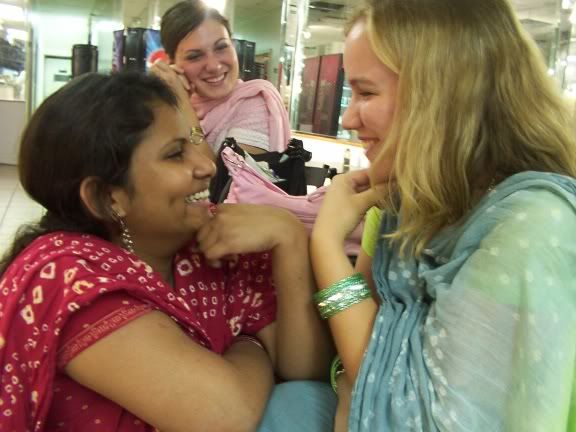
The vision is JESUS - obsessively, dangerously, undeniably Jesus.
The vision is an army of young people.
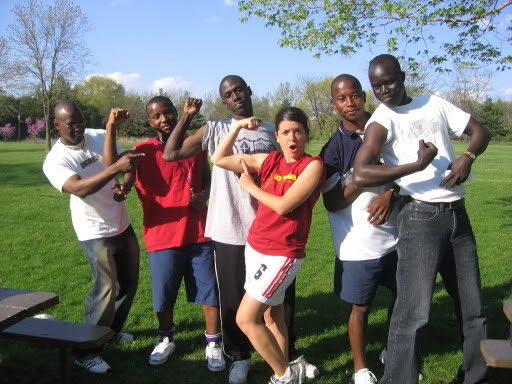
You see bones? I see an army. And they are free from materialism.
They laugh at 9-5 little prisons.
They could eat caviar on Monday and crusts on Tuesday.
They wouldn't even notice.

They are mobile like the wind, they belong to the nations. They need no passport.
People write their addresses in pencil and wonder at their strange existence.
They are free yet they are slaves of the hurting and dirty and dying.

What is the vision ?
The vision is holiness that hurts the eyes. It makes children laugh and adults angry. It gave up the game of mini-mum integrity long ago to reach for the stars. It scorns the good and strains for the best.
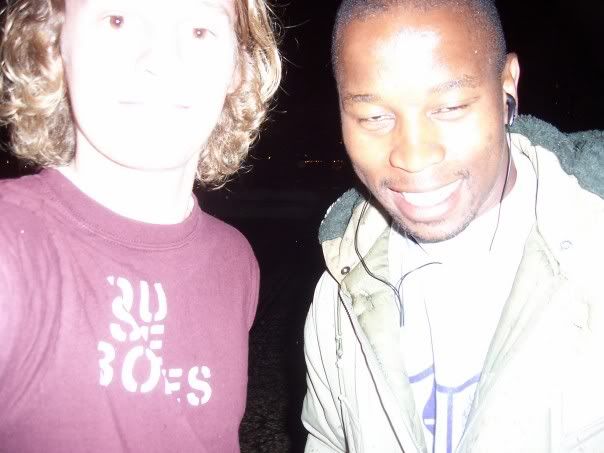
It is dangerously pure.
Light flickers from every secret motive, every private conversation.
It loves people away from their suicide leaps, their Satan games.
This is an army that will lay down its life for the cause.
A million times a day its soldiers choose to loose that they might one day win
the great 'Well done' of faithful sons and daughters.
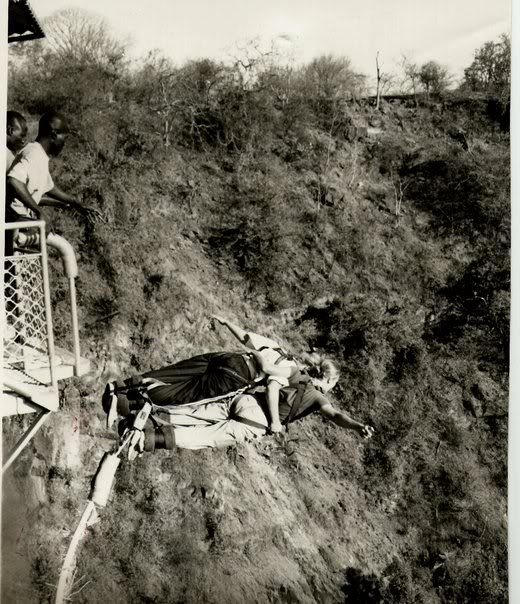
Such heroes are as radical on Monday morning as Sunday night. They don't need fame from names. Instead they grin quietly upwards and hear the crowds chanting again and again: "COME ON!"
And the army is discipl(in)ed.
Young people who beat their bodies into submission.
Every soldier would take a bullet for his comrade at arms.
The tattoo on their back boasts "for me to live is Christ and to die is gain".
Sacrifice fuels the fire of victory in their upward eyes. Winners. Martyrs.
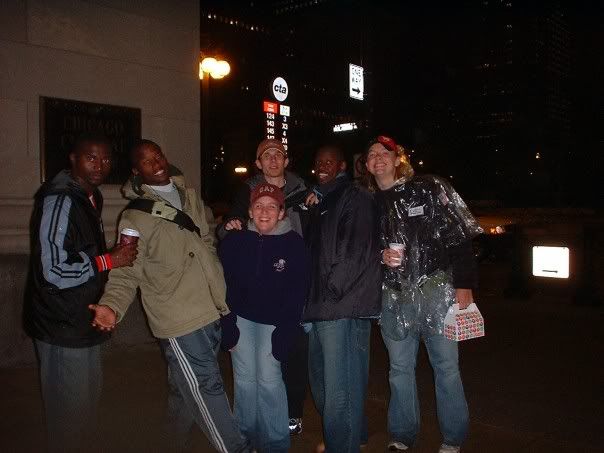
Who can stop them ? Can hormones hold them back?
Can failure succeed? Can fear scare them or death kill them ?
And the generation prays like a dying man with groans beyond talking, with warrior cries, sulphuric tears and with great barrow loads of laughter! Whatever it takes they will give: Breaking the rules. Shaking mediocrity from its cozy little hide. Laying down their rights and their precious little wrongs, laughing at labels, fasting essentials.
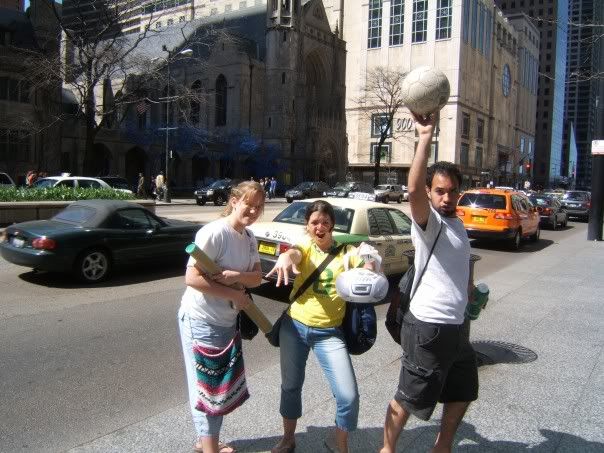
The advertisers cannot mould them. Hollywood cannot hold them. Peer-pressure is powerless to shake their resolve at late night parties before the cockerel cries.
They are incredibly cool, dangerously attractive inside.
On the outside? They hardly care. They wear clothes like costumes to communicate and celebrate but never to hide.
Would they surrender their image or their popularity?
They would lay down their very lives - swap seats with the man on death row - guilty as hell. A throne for an elec-tric chair.
With blood and sweat and many tears, with sleepless nights and fruitless days,
they pray as if it all depends on God and live as if it all depends on them.
Their DNA chooses JESUS. (He breathes out, they breathe in.)
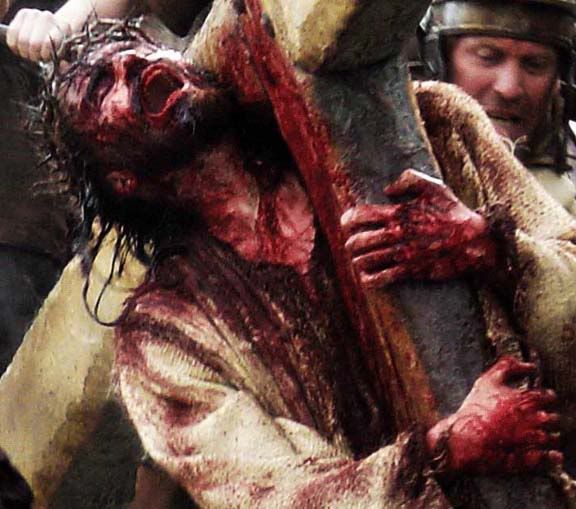
Their subconscious sings. They had a blood transfusion with Jesus.
Their words make demons scream in shopping centers.
Don't you hear them coming?
Herald the weirdo's! Summon the losers and the freaks. Here come the frightened and forgotten with fire in their eyes. They walk tall and trees applaud, skyscrapers bow, mountains are dwarfed by these children of another di-mension. Their prayers summon the hounds of heaven and invoke the ancient dream of Eden.
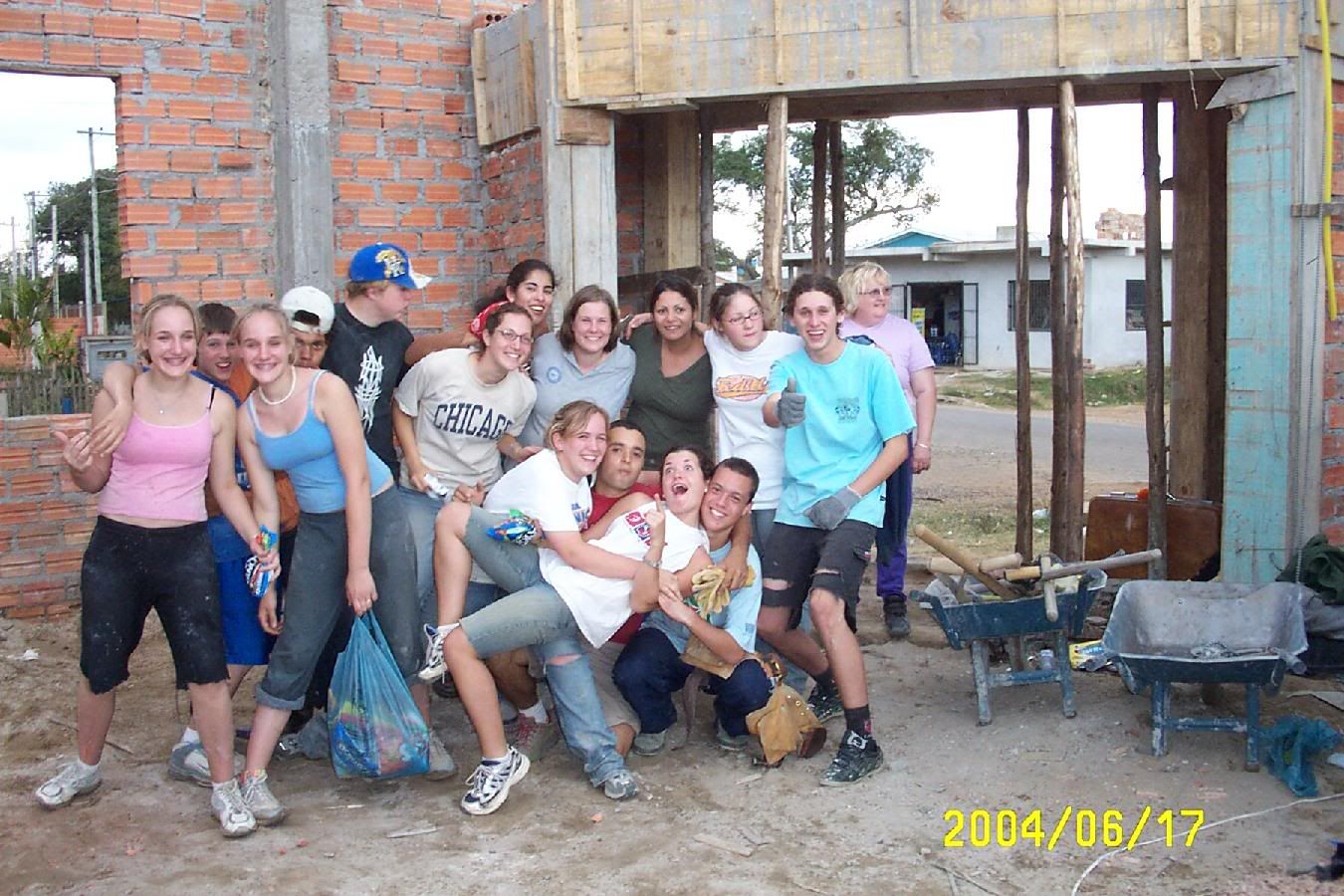
And this vision will be. It will come to pass; it will come easily; it will come soon.
How do I know?
Because this is the longing of creation itself, the groaning of the Spirit, the very dream of God.
My tomorrow is his today. My distant hope is his 3D.
And my feeble, whispered, faithless prayer invokes a thunderous, resounding, bone-shaking great 'Amen!' from countless angels, from hero's of the faith, from Christ himself -
the original dreamer, the ultimate winner.
And that, my friend, is Guaranteed.

*Note: So many might read this poem and see a bunch of serious people in pictures, starving children, crying bodies. But I see it talking about a bunch of people filled with joy and excitement that no one can explain and I see that taking place in my friends every day. So this is dedicated to the warriors called the Olivetians, the internationals, my friends :)
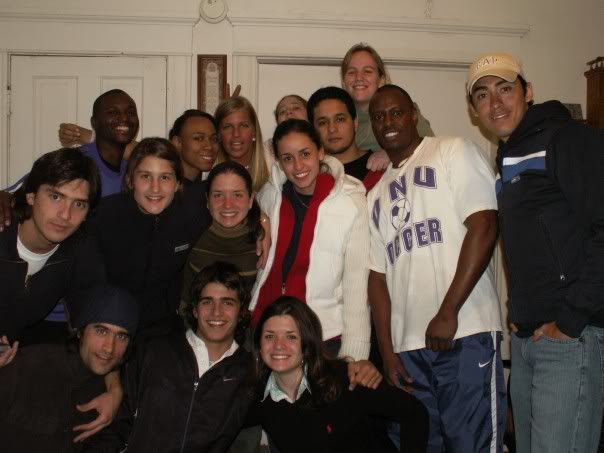
sábado, maio 13, 2006
Eyes
“I have looked into your eyes with my eyes. I have put my heart near your heart.”
Pope John XXIII quotes
“There is a road from the eye to heart that does not go through the intellect.”
G. K. Chesterton quotes
"Those true eyes Too pure and too honest in aught to disguise The sweet soul shining through them”
Owen Meredith quotes
The eye is the jewel of the body.
Henry David Thoreau
The light of the body is the eye: if therefore thine eye be single, thy whole body shall be full of light.
Author: Bible
It is only the women whose eyes have been washed clear with tears who get the broad vision that makes them little sisters to all the world.
Author: Dorothy Dix
quinta-feira, março 30, 2006
domingo, março 26, 2006
sábado, março 25, 2006
SOS
CONTROLLER="TRUE" AUTOSTART="TRUE" LOOP="TRUE"
VOLUME="50%" BGCOLOR="000000">
See the video at NikeWomen.com
quinta-feira, março 02, 2006
Four Things
1. High school - Wendy's
2. Right after high school - Westside Church
3. Bentcil for 3 years
4. T.A and Soccer manager at ONU
Four Movies I Could Watch Over and Over:
1. Diarios de Motorcicleta
2. Les Miserables
3. The Count of Monte Cristo
4. Charade
Four Places I Have Lived:
1. York, PA
2. Harrisburg, PA
3. Indianapolis, IN
4. Bourbonnais, IL
Four TV Shows I Love to Watch:
1. Friends
2. Early Edition
3. Lost
4. ER (The old ones with George Clooney)
Four Places I Have Been on Vacation:
1. Brazil
2. FL
3. ME
4. D.C.
Four Websites I Visit Daily:
1. Facebook
2. E-mail
3. Orkut
4. Xanga
Four of My Favorite Foods:
1. Churrascurias!
2. shrimp scampi
3. potatoes
4. Peanut butter and chocolate together
Four Places I Would Rather Be Right Now:
1. Brazil
2. Argentina
3. Germany
4. Italy
Four Most Wonderful Places I've Ever Been:
1. Brazil
2. Washington, D.C.
3. FL
4. Chi-town
Four Jobs I've Had in My Life:
1. High school - Wendy's
2. Right after high school - Westside Church
3. Bentcil for 3 years
4. T.A and Soccer manager at ONU
Four Movies I Could Watch Over and Over:
1. Diarios de Motorcicleta
2. Les Miserables
3. The Count of Monte Cristo
4. Charade
Four Places I Have Lived:
1. York, PA
2. Harrisburg, PA
3. Indianapolis, IN
4. Bourbonnais, IL
Four TV Shows I Love to Watch:
1. Friends
2. Early Edition
3. Lost
4. ER (The old ones with George Clooney)
Four Places I Have Been on Vacation:
1. Brazil
2. FL
3. ME
4. D.C.
Four Websites I Visit Daily:
1. Facebook
2. E-mail
3. Orkut
4. Xanga
Four of My Favorite Foods:
1. Churrascurias!
2. shrimp scampi
3. potatoes
4. Peanut butter and chocolate together
Four Places I Would Rather Be Right Now:
1. Brazil
2. Argentina
3. Germany
4. Italy
Four Most Wonderful Places I've Ever Been:
1. Brazil
2. Washington, D.C.
3. FL
4. Chi-town
quinta-feira, fevereiro 02, 2006
Smiles
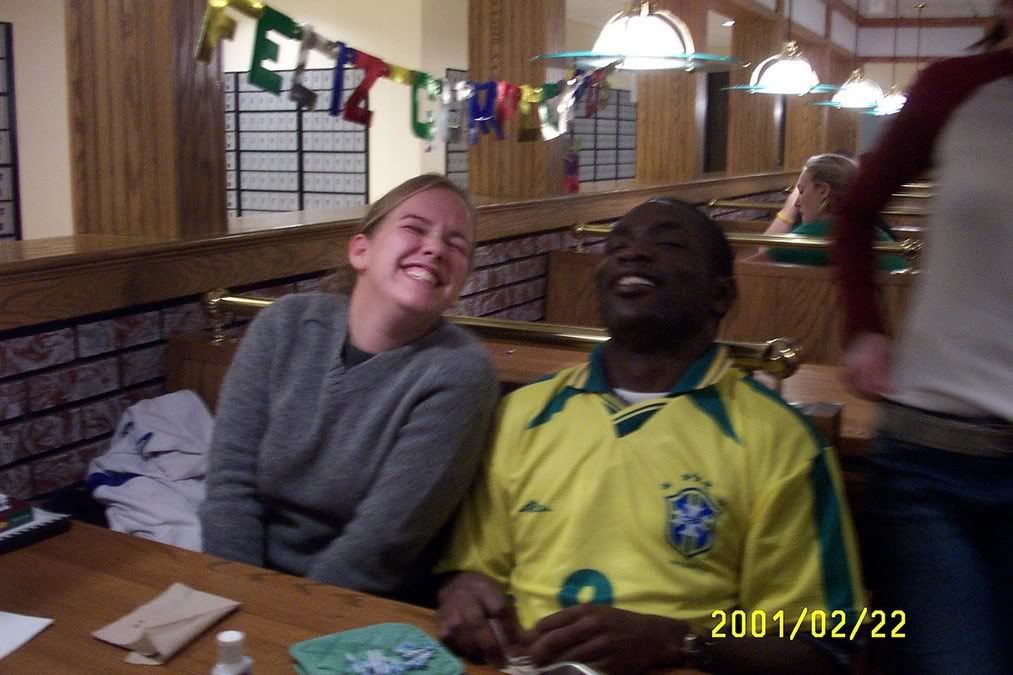
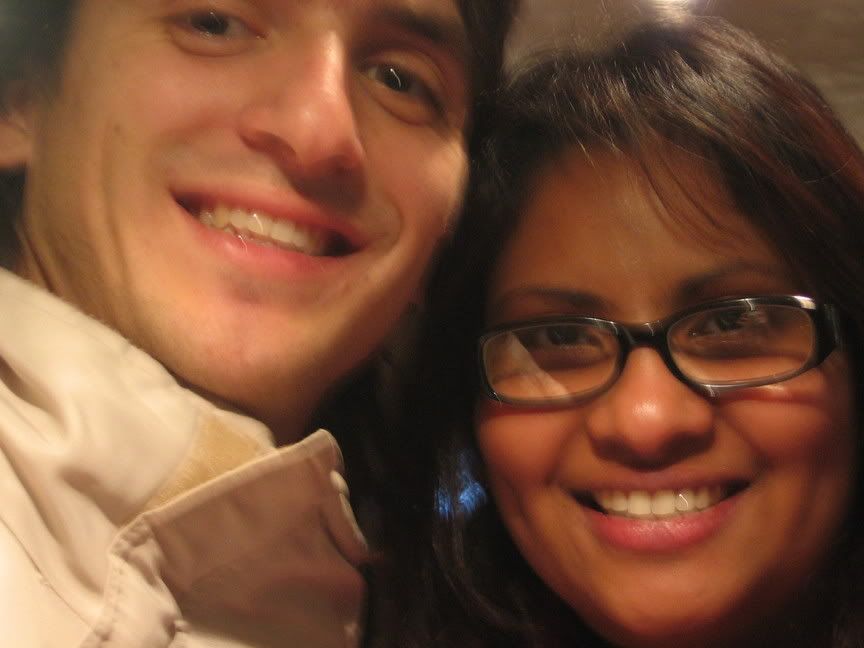

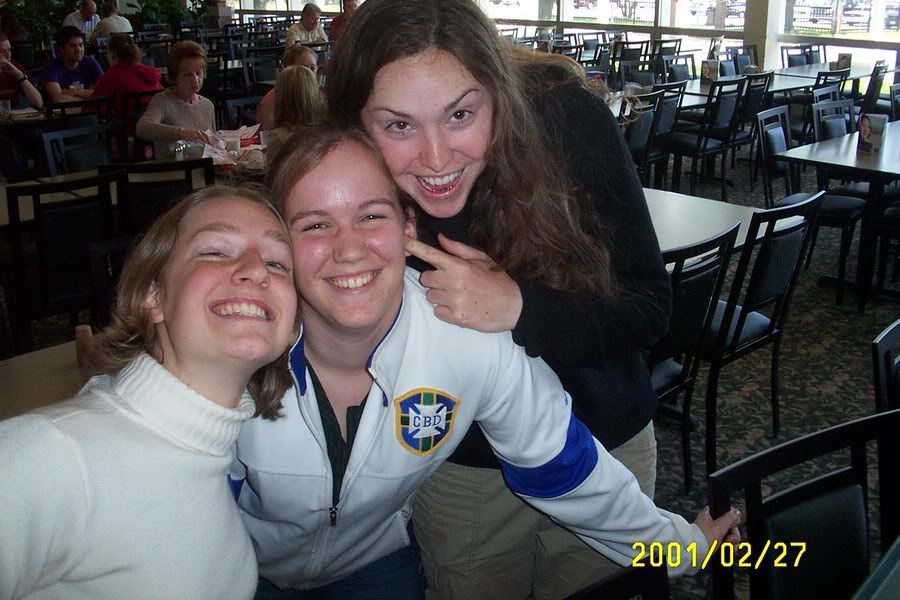


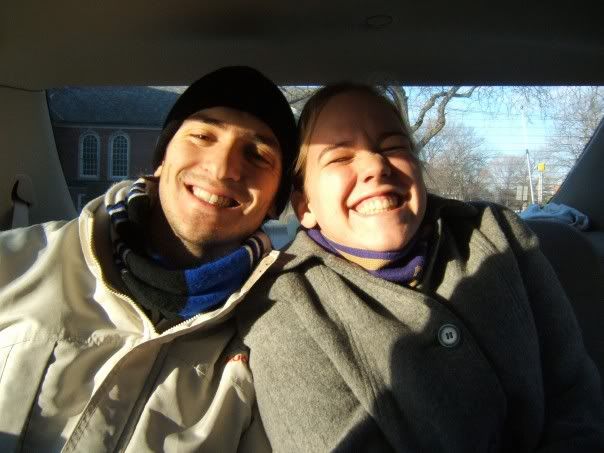

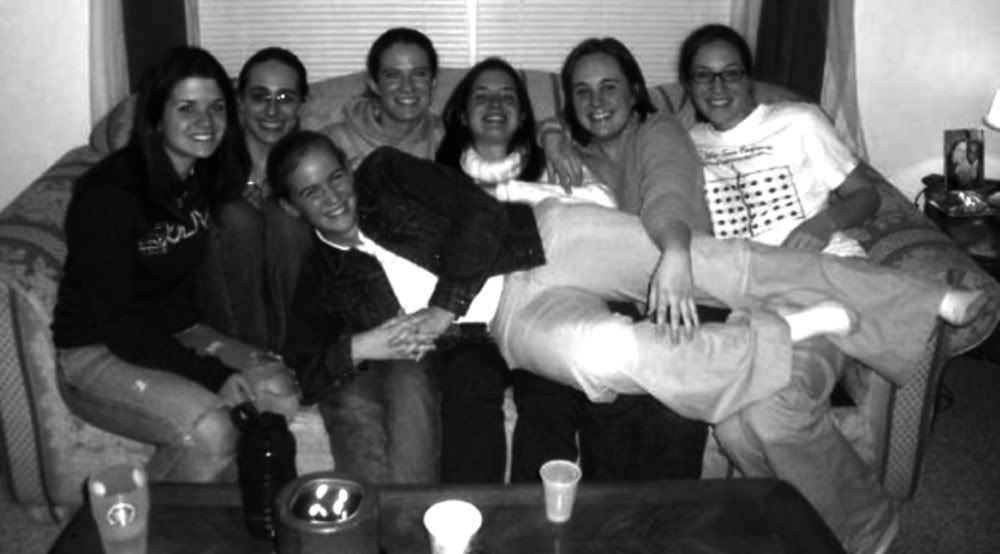
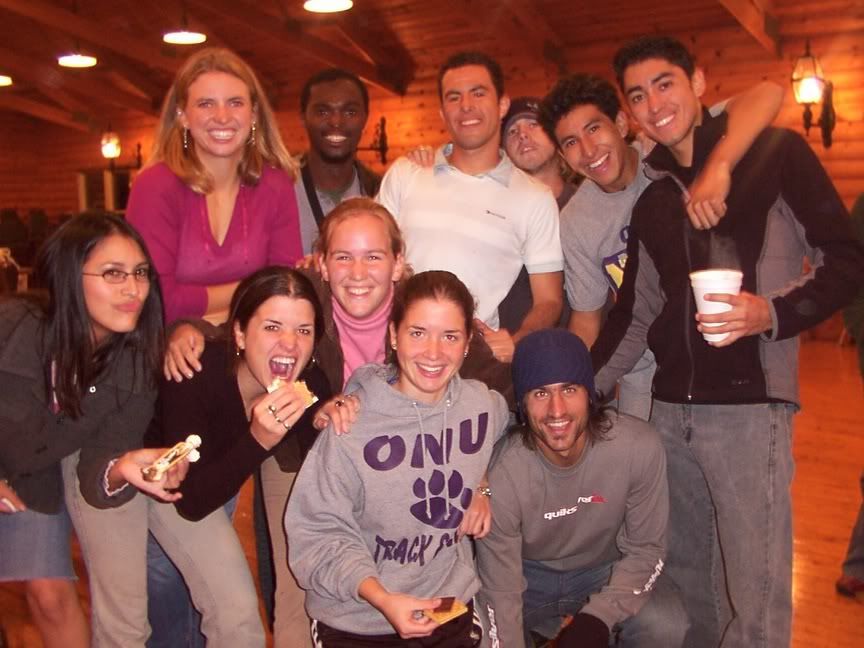
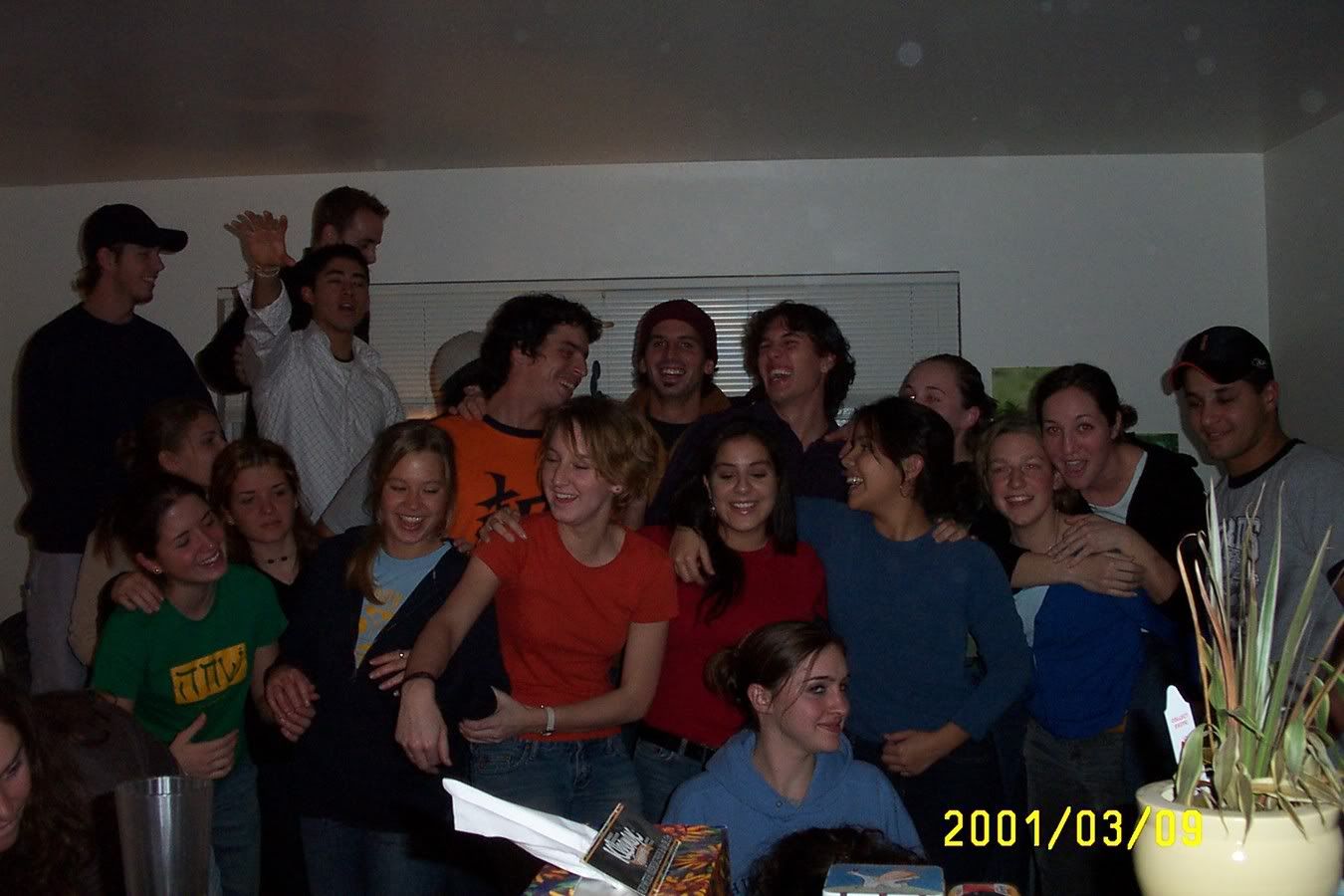
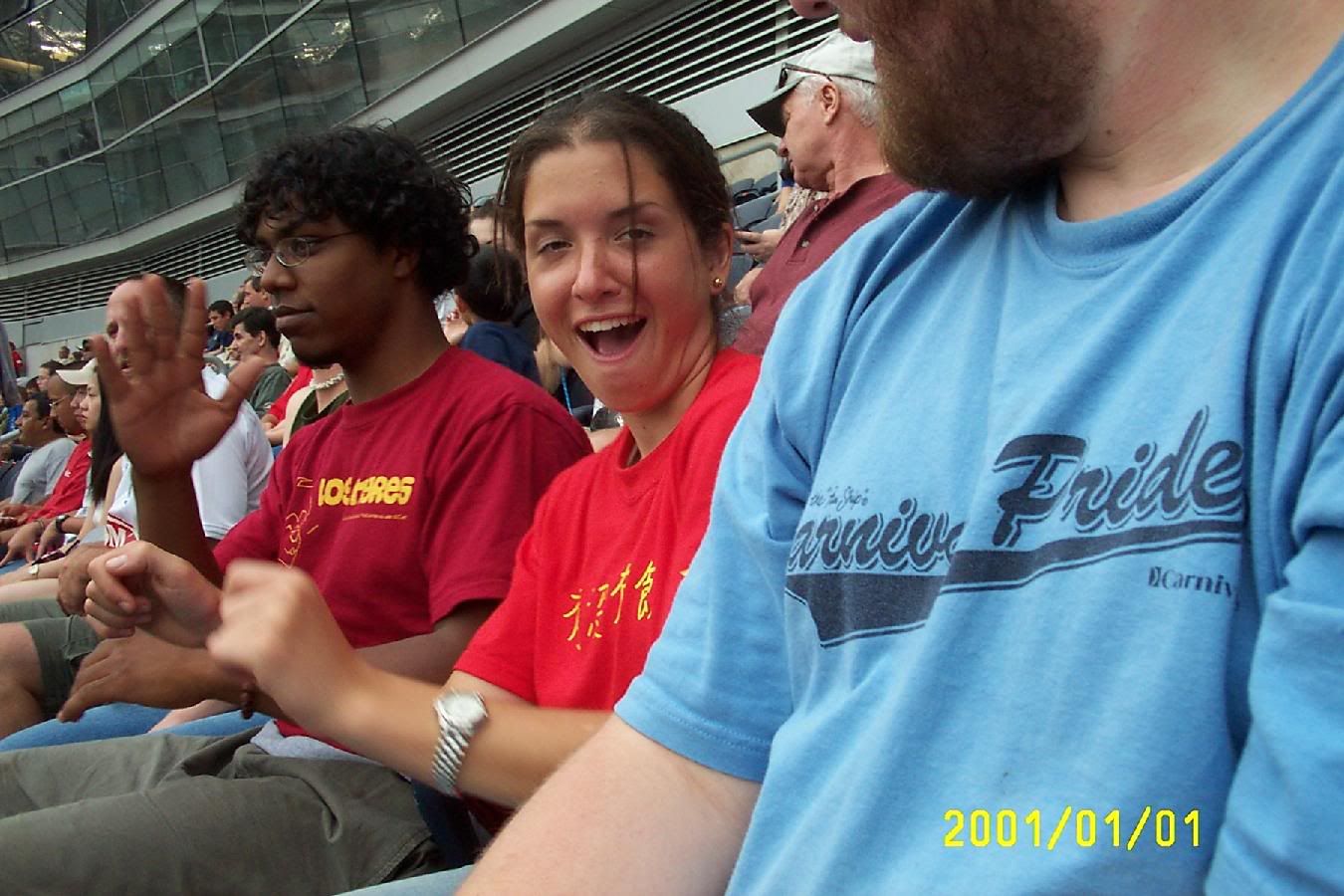
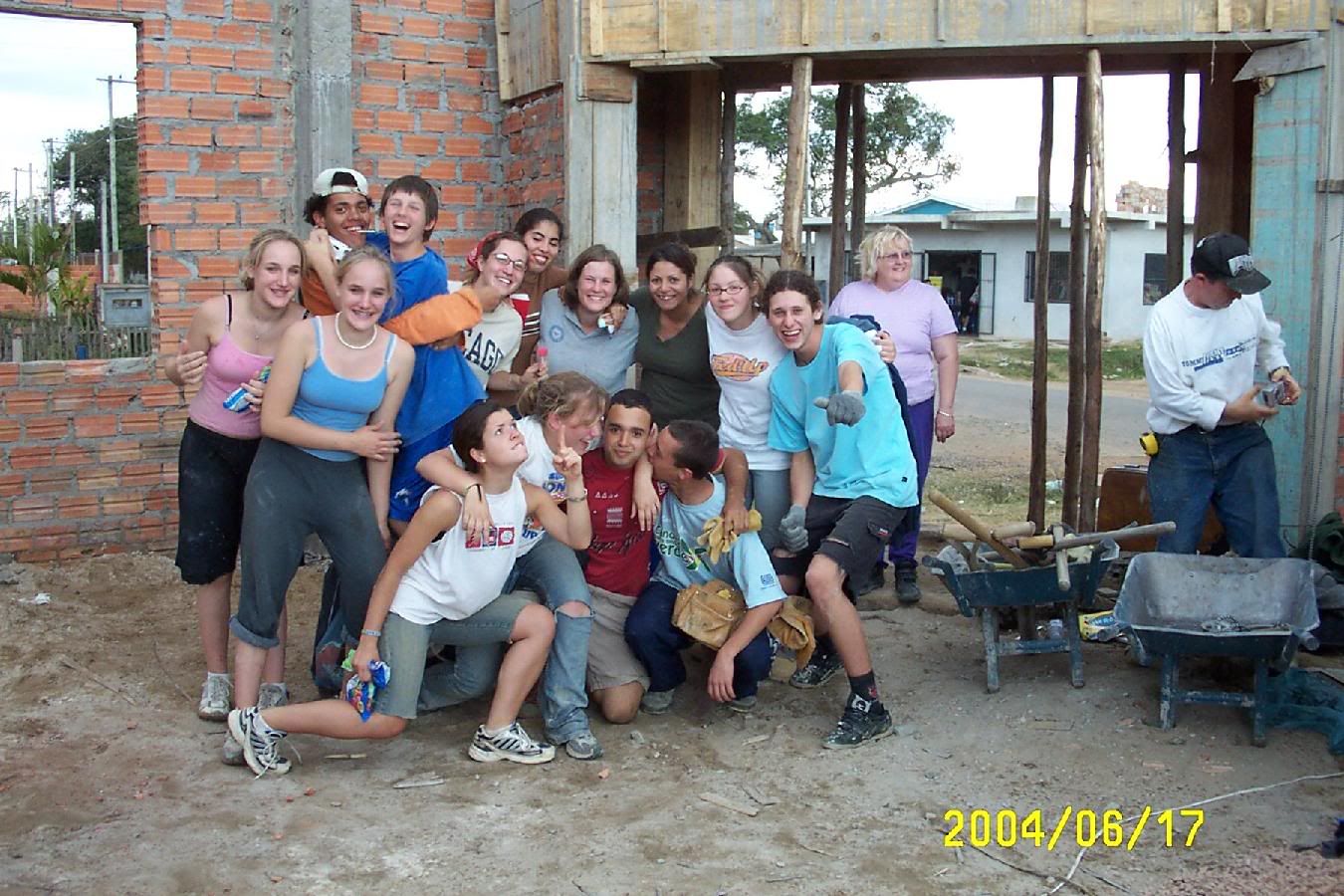
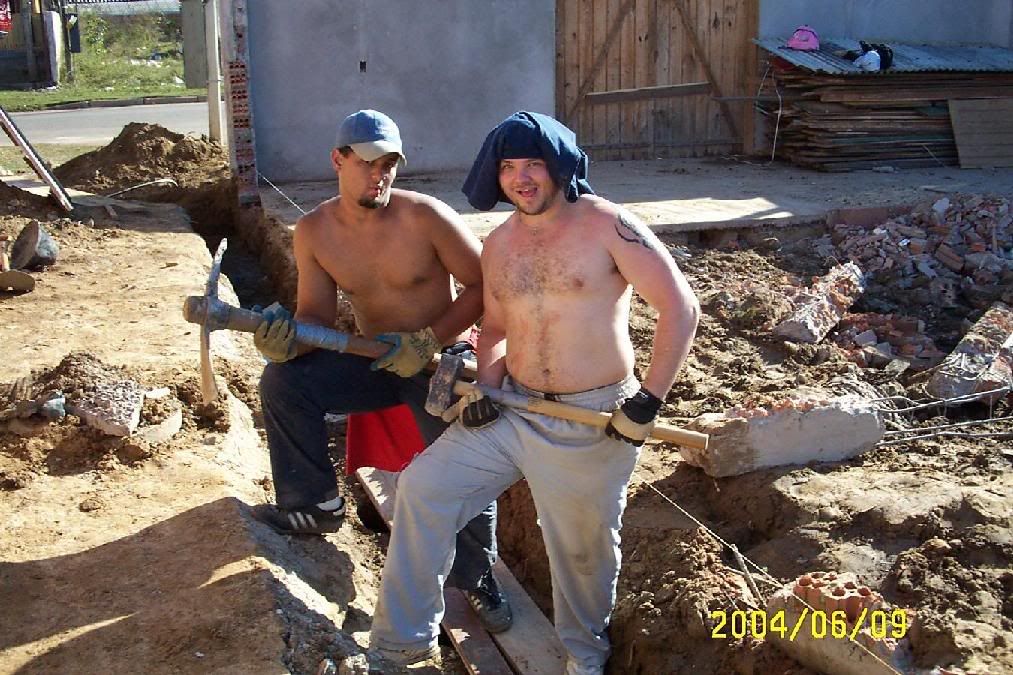
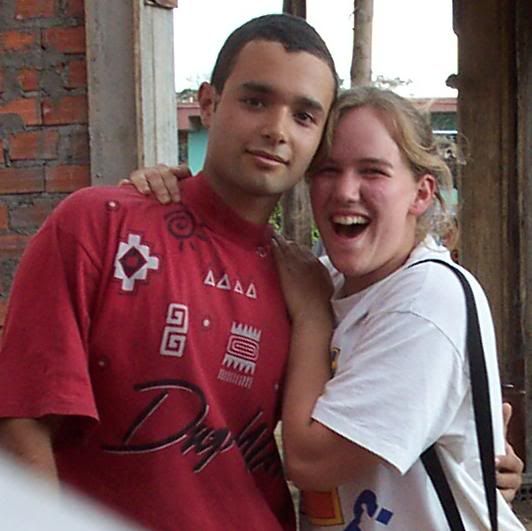
quarta-feira, fevereiro 01, 2006
Alone in the Silent Dream
Moving on suggests leaving behind but how can I leave behind myself and my friend? For friend, if nothing else, is what you are. That among many things, these things including impossible-- both impossible to have and impossible to leave. So do I say to leave, advocate leaving, leave me alone? Alone and lonely, lonely now with one less love but also one less friend? So why say anything and all that would give me away? Away from you from whom I tear in tears and private conversation which is not at all conversation when I am alone and alone is what I am now without the dream, though at times a nighmare where the night would wear on and on with a confession of love to the silence and the response through the years, no need to ask, was or would have been never.
Never would you see me, confide in me. Never would your eyes pause even on my shadow and in the shadows I would and will stay. Through the moments, not a moment's thought. Through the thoughts of someone else. Something, and nothing else, and I fall, the silence falls, and I fall into silence. The comforting nightmare of silence because it is nothing else.
segunda-feira, janeiro 30, 2006
To Heather

There was a sparkle in your eyes
Sometimes I know that it's still there
I search for you in earth and skies
Knowing that finding is future somewhere
You're not lost, not with us crying
We look within our empty selves
Do you feel it's us who are dying??
Thinking that somewhere we'll find your help?
I keep thinking the road is still ahead
That you and I have more travels to take
That someone unknown was in your stead
And the sadness around me is only fake
I truly wish my joy was real
That I could in all honesty say
That the selfishness is not what I really feel
And that I take comfort in our reunion day.
But how does that help me in later years
When my kids don't know you and I can't explain
The wonderful times and occasional tears
That come every time that they mention your name.
Independently Together
terça-feira, janeiro 24, 2006
Who is responsible?
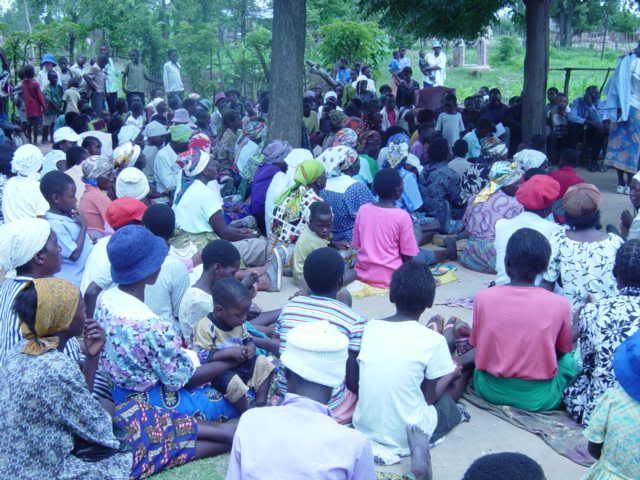
Liberty and Justice for All
America is a land that lives under the statements “All men are created equal” and “With liberty and justice for all.” A Bill of Rights states that to which men and women of every race, faith and culture, under any circumstance are entitled. But what is justice? Who is responsible for demanding and delivering justice? How can a world in which many hold the beliefs of moral relativism grasp and demand a universal justice? Questions continue to form the more I read, hear and see and, as was stated in class, once you have known, you can’t turn back.
The Problem: Ignorance and Injustice
Perhaps this, alone, explains the comfort of the general public of America—the lack of knowledge and experience of the sufferings of the world behind each political conflict. Despite having such a wide variety of means of communication, the average American has never seen the face of a starving six-year-old in Africa nor heard the story of a Christian Palestinian in Israel. In fact, some would go as far to ask why the child’s parents couldn’t get a job?
As the article by Fred Van Geest pointed out, places like Nicaragua, a starving and hurting nation, are serving as “warnings” of what happens in the unfortunate circumstance that a government might take a position, fail and, as punishment, its people suffer, hunger, and are punished. In such circumstances, one must, in fact, ask just who is being punished and is this punishment, in any sense, just?
The first step, before one ever defines justice, is to define injustice, knowing the problems and the issues. As I was preparing, my mind was bombarded with more questions than answers and it was during one of these mental battles that a certain scene came to my mind. Over Christmas break I was discussing some issues that were rather argumentative through my school district which revolved around a new (and Jewish) district superintendent who had outraged many parents when he refused to allow certain traditional Christmas celebrations and festivities. My stepbrother, who is commonly influenced by the prejudices of his father, made a derogatory statement towards Jews and, in response, my step-mom became flustered and told him to be careful. “The Jews are God’s chosen people.”
After much interaction and discussion with an individual who grew up in a Palestinian refugee camp, this comment was slightly unnerving. My readings thereafter, however, have given voice to what I felt at that moment. In a strong, Republican household, many a joke about the “wimpy Frenchman” and the “towel head” has floated through the air and I can’t help but ask in such a situation, where is the consideration for God’s chosen Frenchman, God’s chosen socialist, and God’s chosen Palestinian? Perhaps one should be more aware, in these circumstances, that the argument is not necessarily with the individual, but with the government, because it is the cultural jokes and lack of face—the ignorance that is at the very root of the injustice.
In his book, Blood Brothers, Elias Chacour asks the one who claims the faith of Christ, "Can you help me to say that the persecution and stereotyping of Jews is as much an insult to God as the persecution of Palestinians?” He later goes on to say, “God’s Israel included ‘foreigners,’ those who were not of the fleshly tribes of Israel, but who had been grafted into his family,” later quoting Galatians 3 and Romans 9, both of which state that Abraham’s children and God’s chosen people are not as such by birth, but by God’s grace and by the decision to follow Christ and, as Paul stated, likewise “not all descended from Israel are Israel.” Of whom do the prophets speak when they speak of Israel? Could God’s Promised Land not be something that is not material? Could God’s promise be extended to those who are not Jewish? As Christians, we must think more of God’s vast capabilities that reach beyond the material world in which we live.
At one point, in fact, Chacour points to the disadvantage many people of the west may have in their graspings of God’s likeness. I have often asked how those who suffer so greatly under persecution and face the worst should they convert would ever come to know Christ. One would think it should be easier for someone who has everything to acknowledge God in His character. However, Chacour makes an interesting point saying at one point that,
"People in the West seem so taken with material things. It's as if they have nothing in their spirits, so they need to surround themselves with nice comforts. ...The real problem is that Western theology starts with man as the center of all things and tries to force God into some scheme that we can understand. Then He can be regulated. Elias, we've grown up believing that God is the beginning and end of all things. He is central, not an afterthought. He's alive and has His own ways. Here, they want to tame God with their philosophy."
There is also a common misconception that the Palestinian conflict can never be solved as it is a part of God’s prophecy and plan, but is it a part of God’s will? Can God not care for the individuals involved in such a large-scale issue? I think in this statement, too many Americans would be happy to dismiss it as an issue never to be solved rather than to see “God’s plan for peace between divided brothers (Blood Brothers).”
Therefore, if we are to define justice and to solve the problems of injustice, we must realize that, as is stated in the article Biblical Basics on Justice, “God’s will for all is shalom, and the task of the community of faith is to do God’s will.” The task is liberty and justice for all, which means, as much as the average American would like to take the isolationist views of what is and is not our problem, we cannot back down of the responsibility that comes with our economic relationships (Fred Van Geest), nor can we be restricted to these relationships in say that it is not our problem because (as a politician stated in Blood Brothers), "I do not have hundreds of thousand of Arabs among my constituents."
“The injustices in other countries may be considered ‘foreign issues’ and therefore outside the realm of domestic responsibility. However this position fails to account for the relational character of international relations. …[Economic] relationships should not be considered impersonal, value-free market transactions,” says Van Geest who, in fact, continues by saying, “The biblical vision is a vision of a kingdom that transcends American, Canadian and European interests. One of the most prominent evidences of Christian weakness in the world today is the failure to pursue this political vision together in international community for the sake of justice for all people.”
According to the article Letting Justice and Peace Embrace, “The U.S. government—urged on by its citizens—will need to think less in terms of protecting its own national interests, still less of guaranteeing security against any possible future threat, and more of humbly accepting leadership in the challenge to promote multifaceted, global public justice.” One cannot, as a Christian, think solely in terms of America and its people because, as a responsibility to God and His Word, we are responsible to all with whom we have any form of relation, and these relations can be as a friend, brother or sister, or as someone whom you have not met but whose workplace you both effect and form. This, in fact, is addressed in the article My Sweatshop, My Plantation, which encourages the idea of boycott of companies who practice illegal and immoral treatment of employees.
In general, I would have to agree with the article, but I also would like to ask (on a side note) what happens to the employees of these companies when their jobs are cut from them? Sometimes we consider the idea of the job conditions and say that we cannot support a company who treats their workers as such. True. But what about countries where those are the kinds of jobs that are available. What can we do in a situation where to buy the goods is to support the torture, and to not buy is to take away the job and support the starvation?
The Definition: Justice and Mercy
The question one is asking when trying to define justice is simply what is the character of God and thus what does He expect from us? The face of God is to be shown through every Christian in all that they do as He, according to Chacour, “demanded that they demonstrate His own character to the whole world, that they show forth the face of God in every action from the way they conducted their government down to the use of fair weights and measures in the marketplace.”
In this sense, one must look at God in His full character in what seems to many a complete paradox—the paradox of being both a God who is just and a God who is love. Perhaps, however, when seeing the two as a paradox, one misses the concept of both justice and love altogether as, in a sense, they are one and the same and thus one then can equate the God of the Old Testament (often associated with justice) with the God of the New Testament (who’s focus was love) as they are indeed the same God.
The best illustration of this is found in the article The God Who Loves Justice, which sets the inevitable first point definition of justice when Wolterstorff says, “God’s love of justice inevitably implies God’s hatred of the injustice to be found in that world.” It is in this article that one can discover the Hebrew and Old Testament of shalom, a common greeting and concept in Hebrew (and thus Jewish) culture. This concept is defined by the, “flourishing in all dimensions of one’s existence. …God’s desiring the shalom of each and every one—not merely freedom from violation of one’s property but the flourishing of each and every one.” And it is this concept of shalom that is tied with justice by Chaplin when he defines both similarly as, “the right ordering of all things.”
Therefore, if our goals are Christian and our conquest is for peace, we must consider Chaplin’s statement of “Peace without justice is illusionary and transitory. But, equally, the route to justice involves nurturing peace along the way.” Are we, as Americans, doing our homework? Are we considering the people of the nation when we engage in the battles we feel are necessary? The call here is not a matter of whether or not to go to war, that is not my argument. The consideration is as such, that when we war against the government, we must consider the individual people and culture—are responsible for making sure that, in the process we know what is to their benefit and to “nurture” peace in such a way that we are not providing an American solution to a foreign conflict, but that we are Americans working towards a solution that works.
Likewise it is not our responsibility to discriminate or distinguish whom to “punish” and whom to help. Justice is not about punishment as much as it is about mercy and the relinquishment of injustice. God’s justice was not defined so much in terms of punishment as it was when he “raised the poor form the dust, and lifts the needy from the ash heap, to make them sit with princes, with the princes of his people. God gives the barren woman a home, making her the joyous mother of children.” (Psalm 113:5-9)
In our own pledge, we commit to justice for all and thus must remember as such to whom our responsibilities lie. “The way of a peacemaker was difficult—it required deep forgiveness, risking the friendship of your enemies, begging for peace on your knees and in the streets,” Chacour says, but this is the occupation to which God calls all Christians in one way or another. We are, according to Van Geest, to be “seeking to advance justice for all, regardless of nation or territory. …All of creation is to be redeemed, and Christians ought to be actively involved in the redemption of every feature of it.”
In doing this, we must look at the unfortunate view of Christians and thus combat these views with action. We must decide who we really are and think of whom we represent. During his years in seminary, Chacour remembers a professor once saying,
"If there is a problem somewhere this is what happens. Three people will try to do something concrete to settle the issue. Three people will try to do something concrete to settle the issue. Ten people will give a lecture analyzing what the three are doing. One hundred people will commend or condemn the ten for their lecture. One thousand people will argue about the problem. And one person-- only one-- will involve himself so deeply in the true solution that he is too busy to listen to any of it. ...”
Who are you in this picture? Are you thinking critically? Is religion a hobby for you as it is for the Christian of whom Oz Guinness speaks when he calls the community to “Look for a place where the Christian’s faith makes a difference at work beyond the realm of purely personal things? …Look for a place where the Christian is thinking ‘Christianly’ and critically about the substance of work.”
I ask myself, am I a Christian of theory and philosophy, the Christian of whom Martin Luther King, Jr. speaks, religion “that professes to be concerned with the souls of men and is not concerned with the slums that damn them, the economic conditions that cripple them, … a spiritually moribund religion in need of new blood?” Do I turn my back to what I see and know, leaving behind the faces of I was Hungry, those who are still very hungry and lonely and cold? What is the character that the American Christian is portraying? I cannot tolerate the idea, nor can I wait to discover the solution to the idea, that I would wish to, as Chacour states in the final chapter of the book, try to “find the easy life of blindness to pain.”
The Solution: Love and Action
“Work for peace is accomplished not by contemplators but by people of action, builders and workers willing to get their hands dirty,” Chacour says. It’s not enough to write the paper, to read the stories, to remember these things—one must act upon it out of the pure passion that comes into the heart. Decide right away what your god is and that god you must serve. What are you committed to? Because, as I have discovered through classroom lectures, discussions and out-of-class conversation, whichever god is chosen demands total surrender and if I were to put my hands in the gods I created on my own—in the quest for self-satisfaction, the god of self, of material, of laziness, of nothing at all, how can anything get done? If your service is not towards others, how can others serve you? However, if you join in one “pure and holy passion,” you trust not in the Gods you have created, but in the God who created you and you are never alone.
Micah 6:1-8 says. “With what shall I come before the Lord, and bow myself before God on high? …He has showed you, O man, what is good: and what does the Lord require of you, but to do justice, and to love kindness and too walk humbly with your God.” The message is as such that love is the answer—love in its just and verbal form.
Chacour has begun to work solutions in his situations, but a similar concept of reconciliation can be spread throughout the direst of places all over the world—the concept of reconciliation with Christ and the Christian community. The spreading of the idea that Christians are not the self-absorbed and judgmental conquerors some view them to be, but that the love of Christ is active in many forms. “Christians must begin applying Biblical principles to specific contemporary public policy,” to begin with (Van Geest).
What are we “really doing with our lives and the gifts God has given us?” Where does your heart lie? What do we hunger for? “Is it a kind of spiritual hunger that does not stir you to do anything,” as described by Chacour in For What do You Hunger and Thirst? Do you truly feel the hunger that goes/reaches to the hunger of the Rwandan and the Palestinian? Do you share the pain of humanity?
What are the solutions? I only wish I knew them all. Many times I wrestled through the active ways that I could change these things and it is then that I realized that there are keys to the doors of different areas. Many times I would argue that the approach is first to the people and then to the government. I would argue that the politicians are the furthest from changes of hearts, which is the primary goal in reconciliation. However, they are nonetheless very instrumental and important. The stages begin with the heart of the individual, to the restoration of a community, to the restoration of a government that can allow for more changes of hearts. The three foster each other, but the beginning and personal level is that of relationships and the honor with in them.
Many times I read the horrors committed on behalf of each country and wondered how did the countries expect respect if they did not give it? How can reconciliation occur in an environment of oppression—one that lacks the idea of human dignity and hope;
“The stiff laws of the Old Testament were only a shadow of the higher law of God’s love,” Chacour says. “… One of the first things Jesus did when He reconciled man to God was to restore human dignity. …Only by regaining their shattered human dignity could they begin to be reconciled to the Israeli people, whom they saw as their enemies. This, I knew at once, went beyond all claims of land and rightful ownership.”
When asked, “What do you think is the greatest need of all?” in the Palestinian villages, Chacour responded, “Hope. …Palestinians need the hope of a future. Hope that one day we can reconcile with the Jews and live in dignity again.” The Hearts and Minds article stressed this in the sense that this is more than just an idea to be played around with-- “This is not a time for peace loving, but rather for peacemaking, which is much more demanding.”
This brings us back to the idea of peace, of justice, and of shalom. Does peacemaking always mean the absence of war? Letting Justice and Peace Embrace makes a good point in the idea that;
“Imperialist, genocidal Nazism could be conquered only by force of arms. Violence within states may also require coercive intervention from outside, a challenge to which the international community is slowly waking up. …Whether the Iraqi people could have been liberated without foreign military intervention is doubtful, but now we’ll never know. International military activity must not, however, cause more injustice than it aims to redress… must consider all the costs.”
What are the implications of this? Again, the implications indicate the knowledge of how the actions will effect and be received by the culture in which the people reside. However, “we can’t ourselves eliminate war from our fallen world.” Some issues require political intervention and military action when considering a corrupt and harmful government. The importance is war as a means to shalom—the peace and prosperity of the people who reside in the affected land.
Frustrating to me is the lack of action by those who would still debate the war in Iraq. To sit around and play with ideas may be entertaining, but what are they achieving in their consistent opposition to something that has already happened. At this point, perhaps they themselves should think less of making an “I told you so” point and peace loving, and think more about peacekeeping both in Iraq and on the home front. Would they have everybody pull out and leave a country in chaos and inevitable self-destruction, thus being inconsiderate to the lives of Iraqis they so often claim to “defend?” What will these people say to troops returning home from Iraq who are dealing with emotional issues of war, of missing family, of losing friends? Perhaps supporting the troops but not the war is an interesting concept, but it is a theory without practice along with the rest of the debate.
Let’s move past the nationalist views and idealist thinking. Move past the days of debates that go nowhere and produce nothing, and show the world justice in action. Look just once into the face of the Brazilian boy running barefoot through the third biggest city in the world. See his bony frame and his outstretched hands and do something about it. Embrace his heart, fill his stomach, and show him the road to true dignity that leads to a peace that the world can never provide. Show them a peace that is not brought by a government, a fulfillment to both physical hunger and their hunger for a constant state of being. While policies are rightfully debated in the houses of politics by those who are hopefully thus called to change the large scale picture, those who are so called should follow the footsteps of Christ to reach to the immediate—bringing a hope and immediacy to an issue that has seemed, for so long, lost and unheard of. Who are you? What is your call? Can we show this nation what they agree to as citizens living under “freedom and justice for all?”
“He did what was right and just, so all went well with him. He defended the cause of the poor and needy, and so all went well. Is that not what it means to know me?” –Jeremiah 22:15-16
Changing the World: One at a Time
The first statement made in times of change is that of planning. There are several aspects to planned change, but all include the “conscious utilization and application of knowledge as an instrument or tool for modifying patterns and institutions of practice. (Bennis 33)” Education is key in combatting injustice. One must know how to process the issues and then how to act upon them. For change to occur, the parties involved must know and take an effort to familiarize themselves with the situation and the opposite party. It takes an active education and then an active response. “Peace needs no contemplators,” says a character in Hotel Rwanda, “it needs actors, people who are willing to get their hands dirty, to get up and do something. The same is true for justice.”
The fortold aspects of change are arranged in three different categories. The first is a very Western approach and some call it the “empirical-rational strategies.” This plan assumes that men are rational and wil “follow their rational self-interest once this is revealed to them.” (Bennis 34) Examples of this can be shown in the general view of the United Nations. While this may not be the exact definition of its function, the UN does theoretically have an element of appeal beyond political means that it often attempts to utilize. In its existence, it does indeed allow the movement of many bodies of aid to the hungry and needy, appealing and supporting the stand of Non-Governental Organizations (NGOs) and allowing them times of speech. The key, I believe, in allowing NGOs their place in the UN is that their information “receives grater acceptance by the public and the media, and wider use within the UN system. (Tessitore 201)” These aspects are an asset to global cooperation and understanding on a humanitarian level as opposed (at some points) to the political level which sometimes attempts a greater power. “It is instructive to realize that time and again it was the nongovernmental sector that provided the key strategic, technical, and organizational leadership for developing human rights norms and procedures. (Tessitore 201)”
In a review of the past fifty years, I believe it is important for Christians to not and take to heart the participation of the church in the creation of the Commision on Human Rights, which was initiated by a partnership of the American Jewish Committee and the Federal Council of the Church of Christ. This charter has since branched into several humanitarian committees within the UN, which have also supported several NGOs which have continued to provide relief for desperate times and people. (Tessitore 200-203) There have, however, been failures within the UN which perhaps come from a variety of levels. These are, perhaps speculations to situations which are in the past, however, they point to some other responsibility beyond the control of even a world council. The first failure was, in fact, that which provoked the necessity and movement towards an official stance from the UN on humanitarian issues. There has indeed been a failure of treaties which have been geared towards protection of minorities, but have failed in this “world stoked by hatred and dehumanization. (Tessitore 201)” The other issues have much to deal with the participation of the participants of the UN, those being the governments which make up the majority of the council, which leads to the second aspect of change.
The second aspect is the “application of power in some form, political or otherwise.” This is primarily dealing with law and administrative power and their abilities and attempts to evoke change through the leadership roles enforced. (Bennis 34) Some of the difficulties in applying this method towards change is that “the use of political institutions to effect changes arises from an overestimation by change agents of the capability of political action to effect change in practice.” Adding to that is the idea that whatever may be passed by the government to change some things that have become norms within the culture must also be accepted into practice by the people who carry it out. The effectiveness of the government is based solely of the effectiveness of the next aspect of change—the re-education of those who are in relation and take responsibility and acceptance of the said policy or law. (Bennis 54)
This also, however, heavily relates to the role of government in the humanitarian issues of the UN. States in its membership have not worked to benefit the system, which is evidenced in “an increasing reluctance to grant asylum…” and “failure to negotiate safe passage. (Tessitore 204)” For the interests of the government, the humanitarian aspects of the UN have been downplayed and NGOs are found to be occassionally fighting for their speaking opportunities within the General Assembly.(Tessitore 200)
One of the most rigid and obvious stains facing this failure towards action has been the conflict in Rwanda and the conflict which now continues in Darfur in Sudan. During this period of 100 days, mass genocide occurred in a form that the world had vowed never again to allow when the Hutus murdered almost one million Tutsis until they were stopped by a Tutsi rebel force. As seen in the move Hotel Rwanda, the UN pulled out, found to be unsupported and unheeded by the governments worldwide, and Tutsis were left to die while the Western world turned their heads aside. In an article released by the Telegraph Group, Hotel Rwanda writer Terri George was quoted in saying that the lack of UN intervention in Rwanda was “one of the greatest collective shames of the rest of the world. …It comes down to racism. An African life is not worth what a European or American life is worth. (These were neighbors)”
Critics look to the words and actions of the government and its officials and see non-action and unwillingness to act. These states, und the Universal Declaration of Human Rights, “have pledged themselves to achieve, in co-operation with the United Nations, the promotion of universal respect for and observance of human rights and fundamental freedoms. …Everyone has duties to the community in which alone the free and full development of this personality is possible.”
Current situations in Africa point to corrupt governments who continue to hoard supposed relief money and efforts, which stunt the growth of the individuals, but which also makes the growth in Africa appear rapid and continuous. According to News Statesman, “If Africa could take 1 per cent more in world trade, it would earn roughly $70bn more annually: that’s three times what it now receives in aid. … In other words, te best intentions will not be enough if western politicians won’t make enemies on Africa’s behalf and persuade their electorates to make sacrifices.”
The individual of the Western world is also criticized for his ignorance. The last aspect, and the one that will be most focused on in this paper, is referred to as “normative-re-educative.” This includes the rationality of men, but is primarily focused on sociocultural norms, which come from the attitudes and values of individuals. The goal of change in this area requires a change in the social norms of a culture and the commitment of individuals to form new ones. (Bennis 34) This aspect of change does not diminish man’s rational capabilities except to say that this intelligence is not as much individual as it is social, which is apparent when one looks at the taboos of a culture. Meanings and accepted traits are communicated through culture and there is a social aspect to individual intelligence. However, there is also a personal level that is internalized and that exhibits evidence of personal habits and values and feelings. The idea behind normative-re-educative change is that the idea must appeal to both the social and personal levels of both the society and the individuals within it. (Bennis 43)
In recognizing groups, there must also be a recognization of the individual within these groups seeing “the person as the basic unit of social organization. …Persons,” Chin and Benne say, “are capable of creative, life-affirming, self- and other-regarding and respecting responses, choices, and actions, if conditions which thwart these kinds of responses are removed and other supporting conditions developed.” The key to the movement of a community is an interaction between the organization (whether it be political, religious or otherwise) and the individual motivating each other into actition and functioning together. (Bennis 48)
America, for example, has the power, the potential, and the constitution which allows and challenges many to move throughout the world in aid. In the formation of the humanitarian branch of the UN, it was said that Americans put the pressure on—each individual to persuade the movement of humans to better humanity. “I said that the voice of America was speaking in theis room as it had never spoken before in any international gathering,” said Fredrick Nolde of the Federal Council of the Churches of Christ; “that that voice was saying to the American delegation: ‘If you make a fight for these human rights proposals and win, there will be glory for all. If you make a fight for it and lose, we will back you up to the limit. If you fail to make a fight for it, you will have lost the support of American opinion—and justly lost it. In that event, you will never get the Charter ratified. (Tessitore 202)”
What has happened to that America that the country now relies on domestic matters disregarding international relations altogether? If change is initiated by knowledge, then I would go as far to say that the American public is ignorant of the international field. In a country that pledges to fight for humanity and diversity, why do her occupants forget Article 2 of the Universal Declaration of Human Rights, which states, “ Everyone is entitled to all the rights and freedoms set forth in the Declaration. No distinction shall be made on the basis of the political, jurisdictional or international status of te country or territory to which a person belongs, whether it be independent, trust, non-self-governing or under any other limitation of sovereignty.”
“The U.S. government,” Chaplin says, “urged on by its citizens—will need to think less in terms of protecting its own national interests, still less of guaranteeing security against any possible future threat, and more of humbly accepting leadership in the challenge to promote multifaceted, global public justice.” Is this practical—something that can be asked of a government run by so many individuals? Perhaps not. Perhaps the whole idea of government relies on a sense of selfishness for one’s own.
However, there is yet an institution not mentioned is the church. This is an institution without excuse, with a background supporting selflessness and service. Films throughout the years have portrayed missionaries who, when governments pulled out or attacked, have stayed with their people to the end. Illustrations such as The Mission, Tears of the Sun, and modern-day examples of the two women imprisoned in Afghanistan for their faith demonstrates the potential of Christianity were it to do its mission full-force. The church has the man-power and motivating force to move people throughout the world. However, again, “Man must participate in his own re-education if he is to be re-educated at all. (Bennis 43)” How does this happen? How can a single individual make an impact? Look at Gandhi, Elias Chacour, and Martin Luther King. These are people from all different stages of emergency, conflict and problem solving and they took a stand against it—the individuals are the mobilizing force on issues.
An article summarizing some of the teachings of Elias Chacour is a terrific demonstration of the role of a Christian and that role is one of responsibility saying, “What happens to my brother is my own responsibility,” and that every man was made in the image of God. This responsibility can be seen evidenced in the students of Chacour when they donated blood to Israelis who were victims of suicide bombings and encouragement was found in the ideas that “Palestinaian blood is flowing in Jewish veins,” exclaims Chacour. Chacour reminds Christians that thought their voices will not be loud, they must be true and must plant peace in the next generation. He was told by a high ranking Israeli official after some of his work that, “we need Christians to be a bridge between Jewish and Muslim worlds.” It’s a dangerous role, but one that perhaps only Christians can fill in showing Christ’s teachings and exemplifying the “most basic premise—that peace cannot be achieved without justice, and justice is impossible without compassion.”
Www.Savedarfur.com is a site emphasizing taking action to prevent the situations such as those which occurred in Rwanda—situations which are occurring currently around the world. Actions can take form in collecting signatures pressuring representatives to respond to the situation, demonstrations, donating money to relief efforts, fasting as a fundraiser (saving the money that would be spent on meals and donating it to the cause),holding a fundraiser or benefit, inviting experts to group sessions (such as some that have already been on ONU’s campus), meeting as a delegation with members of Congress, organize a video presentation with brochures to spread the word, post flyers, push local councils and communities to call upon UN and US action, and educate, educate, educate.
Keep in mind that ignorance is, indeed, bliss. Some of the best breeding grounds for injustice are those to which the world turns a blind eye. And some of the most effective motivators to action include educating one’s self and others about the events happening or that have happened in the world. Can an individual live in true peace once he or she has experienced the injustices around the world and recognized and owned a part in responsibility for it? “The real problem,” Chacour says, “is that Western theology starts with man as the center of all things and tries to force God into some scheme that we can understand.” If Western theology is going to accept such responsibility upon man, then it is evident there should be more responsibility taken for change.
“God demand[s] that [we] demonstrate His own character to the whole world,” says Chacour, “that [we] show forth the face of God in every action from the way [we] conduct [our] government down to the use of fair weights and measures in the marketplace. (Chacour)” If America’s goal is diversity, if true Christianity is our goal, if God’s will is what we seek, and if humanity is whom the UN serves, then it’s about time that each would demonstrate that which they are so fond of saying. Let’s put words behind actions, governments behind policies, action behind memberships and in uniting something can truly happen. Change can indeed occur, but until the world begins to truly care, nothing will change. And the world cannot begin to care if the people in it do not begin to care. In the words of Elias Chacour, the change begins because of “chang[ed] hearts, not simply institutions.”
However, change does not occur when individuals close their eyes and their hearts. In te movie Beyond Borders, Nick (the main male character) talks about the dynamics of change and what happens when one takes upon himself the responsibility for change. “That’s us right,” he asks? “We drown [the cold]. Kill it. Numb it, anything not to feel. You know, when I was a doctor in London, no one ever said ‘medahani.’ They don’t thank you like they thank you here. ‘Cause here they feel everything, straight from God. There’s no drugs, no painkillers. It’s the weirdest, purest thing—suffering. And when you’ve seen that kind of courage in a life… in a child… How could you ever want to do anything but just hold him in your arms.”
